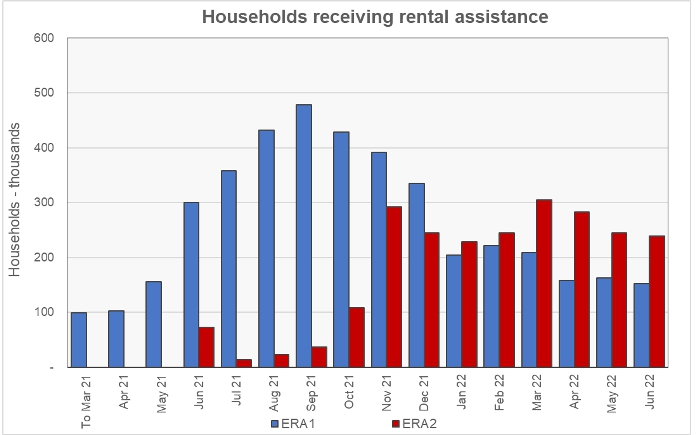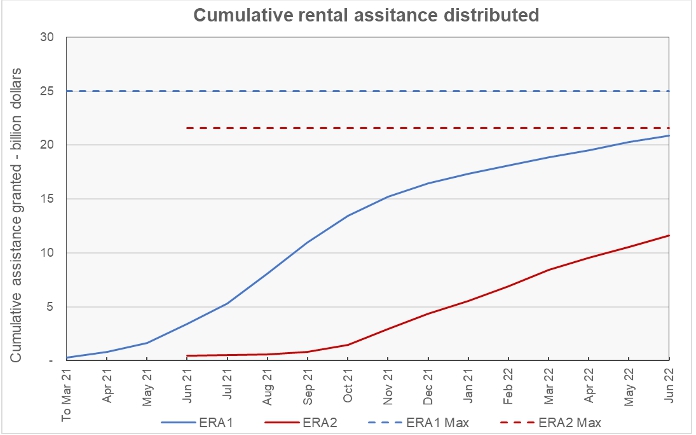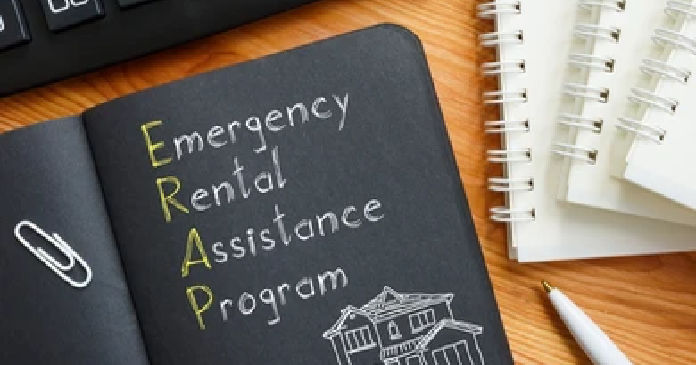The latest report by the U.S. Department of the Treasury states that, as of the end of June, 83 percent of the $25 billion in emergency rental assistance funds allocated under the Consolidated Appropriations Act, 2021 had been spent or obligated. This is up by 9 percentage points since we last reported on this program in May. Of the $21.55 billion allocated for rental assistance under the American Rescue Plan Act of 2021, 54 percent had been spent or obligated by the end of June. This is up by 16 percentage points since our last report. The Treasury department reports on disbursements monthly.
Program review
An overview of the programs was given in an earlier article on this subject. Readers interested in reviewing the outlines of the programs should look there.
The Treasury refers to the emergency rental assistance program established under the Consolidated Appropriations Act, 2021 as ERA1 and the program established under the American Rescue Plan Act of 2021 as ERA2. This nomenclature is used in the charts displayed below.
Charting the emergency rental assistance flow
The first chart, below, shows the number of households receiving emergency rental assistance each month since program inception. However, for each of the programs, the first bar represents several months of activity as the program got going. In the case of ERA1, the first bar represents assistance granted between January 1 and March 31, 2021. In the case of ERA 2, the first bar represents assistance granted between April 1 and June 30, 2021.

In June, ERA1 assistance was granted to 152,277 unique households. This is down from the peak level of 478,035 households who were granted emergency rental assistance in September 2021. ERA2 assistance was granted to 238,717 households in June, down from the peak level of 297,919 households who were granted assistance in November 2021.
Adding up the monthly reports of households assisted under the ERA1 and ERA2 programs gives a total of 6.5 million households. However, a household may receive assistance for up to 18 months by applying to both programs, so the Treasury report does not make clear how many unique households have been served by the programs overall. However, the Census Bureau’s latest Pulse survey estimated that about 3.2 million adults had received rental assistance through early August. Since there may be multiple adults in a household, the number of households assisted is certainly lower.
What’s left?
The last chart shows the cumulative aid delivered under the two programs along with the maximum aid levels the programs made available. The chart shows that both programs still have funds available. However, funds are allocated to local agencies for distribution and some agencies may have already expended all their available funds. Still, residents who meet the programs’ qualifications and who are behind on their rent with no other means of paying it should be encouraged to apply for assistance.

The emergency rental assistance programs are described here.












